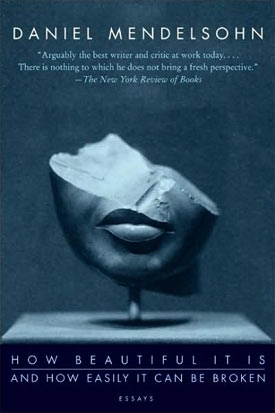|

HARPERCOLLINS 2008
HARPERPERENNIAL, 2009
 


|
|
HOW BEAUTIFUL IT IS
AND HOW EASILY IT CAN BE BROKEN
 A PUBLISHER’S WEEKLY BEST BOOK OF 2008 A PUBLISHER’S WEEKLY BEST BOOK OF 2008

Whether he’s on Broadway or at the movies, considering a new bestseller or revisiting a literary classic, Daniel Mendelsohn’s judgments over the past fifteen years have provoked and dazzled with their deep erudition, disarming emotionality, and tart wit. Now How Beautiful It Is And How Easily It Can Be Broken reveals all at once the enormous stature of Mendelsohn’s achievement and demonstrates why he is considered one of our greatest critics. Writing with a lively intelligence and arresting originality, he brings his distinctive combination of scholarly rigor and conversational ease to bear across eras, cultures, and genres, from Roman games to video games.
His interpretations of our most talked-about films—from the work of Pedro Almodóvar to Brokeback Mountain, from United 93 and World Trade Center to 300, Marie Antoinette, and The Hours—have sparked debate and changed the way we watch movies. Just as stunning and influential are his dispatches on theater and literature, from The Producers to Jeffrey Eugenides’ Middlesex, from The Lovely Bones to the works of Harold Pinter. Together these thirty brilliant and engaging essays passionately articulate the themes that have made Daniel Mendelsohn a crucial voice in today’s cultural conversation: the aesthetic and indeed political dangers of imposing contemporary attitudes on the great classics; the ruinous effect of sentimentality on the national consciousness in the post-9/11 world; the vital importance of the great literature of the past for a meaningful life in the present.
How Beautiful It Is And How Easily It Can Be Broken makes it clear that no other contemporary thinker is as engaged with as many aspects of our culture and its influences as Mendelsohn is, and no one practices the vanishing art of popular criticism with more acuity, humor, and feeling.
 PRAISE and REVIEWS PRAISE and REVIEWS

Arguably the best writer and critic at work today…There is nothing to which he does not bring a fresh perspective.
—The New York Review of Books

Brilliant. . . . Masterful. . . . Wise, funny. . . . A wonderful collection.
— Time Out New York

Mendelsohn looks searchingly and fearlessly both into the subject and into himself. There is never a sense of deliberate contrariness or determination to be different simply for its own sake; what you get is genuine originality and, where necessary, iconoclasm that bear fruit in a fresh look at whatever is under discussion. . . .Unlike so many critics whose writing seems designed to draw attention to themselves and the impressiveness of their mental processes and theoretical underpinnings, Mendelsohn is rightly content to let his methodology speak for itself. His use of classical texts as leitmotif or lodestar is organic to his work, never mere showing off. . . . He can yoke together Euripides and [Tennessee] Williams to the benefit of both, and more breathtakingly still, without in any way cheapening or falsely aggrandizing either. . . . His sweep as a cultural critic is as impressive as his depth.
—Martin Rubin, The San Francisco Chronicle


His wit is invariably harnessed to a graver wisdom; the verve and sparkle to an underlying conviction, often anguished. The epigrams have a purpose other than themselves. He sneaks back and forth over the admittedly notional boundary between reviewing (which he does with elan and something of the contrarian provocation and pleasure of a Pauline Kael) and criticism. His scholarly specialty in classical Greek opens a larger perspective and forges some basic and burning convictions. He employs history, not so much of events as of how the arts have been conceived and used, as a means for judging what we do with them now.
—Richard Eder, The Los Angeles Times

Daniel Mendelsohn brightens the dour New York Review of Books like few other contributors. . . .brilliant… one of the best critics going. “September 11 at the Movies” is probably the smartest and most moving essay I have read about artistic responses to that day.
—The New York Observer

An elegant collection of essays…Mendelsohn reveals intellectual breadth in his ability to draw on his training as a classicist to look at contemporary culture…These essays richly repay the time readers spend in their company.
—Publishers Weekly (starred review)
|
|
![]()
![]()